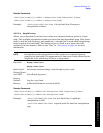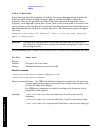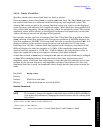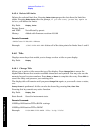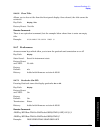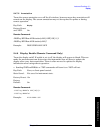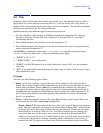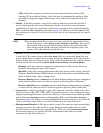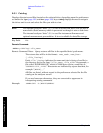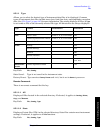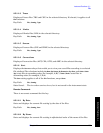
Chapter 2 127
Instrument Functions: A - L
File
Instrument Functions: A - L
2.5 File
Displays a menu of functions that enable you to load, save, and manage data on either a
floppy disk (A:) or the analyzer’s internal drive (C:); you can recall, save, copy, delete, or
rename files of instrument states, trace data, and screen captures. The menu keys display
dialog boxes appropriate for the selected function.
Agilent analyzers use different types of mass storage devices:
• 3.5 inch disk drive (high density, 1.44 MBytes formatted) designated “A:” (Saving
directly to drive A:\ can be slow. Try saving first to internal drive C:\ and then
transferring the file.)
• Part of flash memory and treated as a device designated “C:”
• Part of flash memory and treated as a device for internal use only to store personality
option firmware, designated “I:”
The MMEMory command syntax term <‘file_name’> is a specifier having the form:
‘DRIVE:\DIRECTORY\NAME.EXT’, where the following rules apply:
• “DRIVE” is “A:” or “C:”
• “\DIRECTORY\” is the path name.
• “NAME” is a DOS file name of up to eight characters, letters (A-Z, a-z) and numbers
(0-9) only.
• “EXT” is an optional file extension using the same rules as “name,” but consists of up to
three characters total
File Types
You can save the following types of files:
• State - A file that contains a copy of the state of the analyzer at the time the file is
saved. The settings of most analyzer functions are saved in the state files but not traces,
limits, and corrections. When a
State file is loaded into the analyzer, the analyzer is
restored to the same state as when the file was saved. Some settings are not saved in
the
State files, for example the GPIB address; these settings are called “persistent.” In
this manual, each function describes whether that function is saved in “Instrument
State” or is persistent.
• Trace - A file that contains a copy of the trace data for one or more traces. There are
two formats for trace files, Trace + State and CSV files.
Trace + State: A file that contains the trace data and a copy of the current analyzer
state. The trace and state are stored in an internal data format (TRC), which cannot
be loaded into a PC, but can be loaded back into the analyzer. Traces can be loaded
individually or as a group. When a
Trace + State file is loaded into the analyzer the
trace data that was on the screen, when saved, is loaded into the analyzer. This
enables you to view the trace as it looked when it was saved. Because the state data
is also saved, the analyzer settings, including all the annotation on the screen, is
restoredaswell.Topreservethetracedata,thetracescontainedinthesavedfiles



